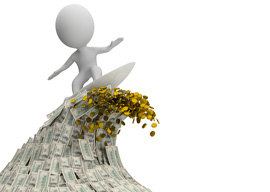
August 30, 2012

Ah, the rich. The rich, as used to be said of the poor, are always with us.
What do we others, we non-rich in all our generality, think of them? I turn to America’s Newspaper of Record for answers:
Americans admire the rich.
They just don’t like them very much.
That’s the conclusion of a new survey by the Pew Research Center that found an overwhelming majority of people have a high regard for those they consider wealthy”with almost half saying the rich are smarter and harder workers.
But the majority also believes the rich are greedy and pay too little in taxes.
And about a third thinks they’re dishonest.
What do I think of the rich? It depends on which ones you mean.
I don’t mind the rich. It seems to me that so long as everyone has the necessities, it doesn’t matter if a few have far more than they can use. We all have the necessities, and then some. Nobody’s starved in the First World for a long time unless they wanted to.
More viscerally: Having grown up poor by mid-20th-century First World standards in a municipally owned house heated only by a coal fire in the living room, and having gone to school with kids who did not wear socks or underpants (remind me to tell you about the “gold medal” sometime), the ordinary middle-middle-class American life seems like rich to me.
Possibly it’s just me”you can take the boy out of, etc.”but I still can’t get over modern life’s sheer glutted extravagance. You have a yacht? A beach house with five bathrooms? Hey, that’s great. My family owns two newish cars! We take vacations in hotels!
And it depends what kind of rich, as it always has, for everyone. Let me number the kinds.
Land Rich. This isn’t of much consequence nowadays, but in preindustrial societies it was the way to be rich. Feudalism was all organized around land wealth. In some times and places, you didn’t merely own the land; you owned the people on it, too.
In older, more conservative societies, the land rich survived well into the 20th century. In revolutionary France, they were massacred or exiled, though their estates soon found new tenants. Why do you think we use a French phrase to identify social upstarts?
The early USA was full of revolutionary spirit, too. It was also full of Land Rich. We weren’t of the temper to massacre our Land Rich, but their continued existence had to be fitted somehow to the Declaration’s egalitarian ideals and to the fact of widespread voting rights.
Thomas Jefferson, Land Rich as all get-out, came as close as anyone could to squaring this circle. He imported into his political philosophy the ancient prejudice of the Land Rich against commerce, banking, paper money, bonds, and debt. (It was a prejudice rooted, like many other prejudices, in fear. It was easier than we now remember for the Land Rich to get helplessly into debt through mismanaging their estates.)
How to get those votes, though? Why, by transmitting to voters one’s own dislike of businessmen, banks, and creditors. Raise up as your model citizen the yeoman farmer, who, though he might not be Land Rich, had at least a fair chance”not a solid one, but a fair one”of being Land Non-Poor.
As a political appeal, this worked for most of the 19th century. When actual yeoman farmers ceased to be much of a constituency, elements of Jeffersonian flimflam survived in the modern Democratic Party. We hear them today: Evil bankers! Predatory lenders! Wall Street paper-shufflers!